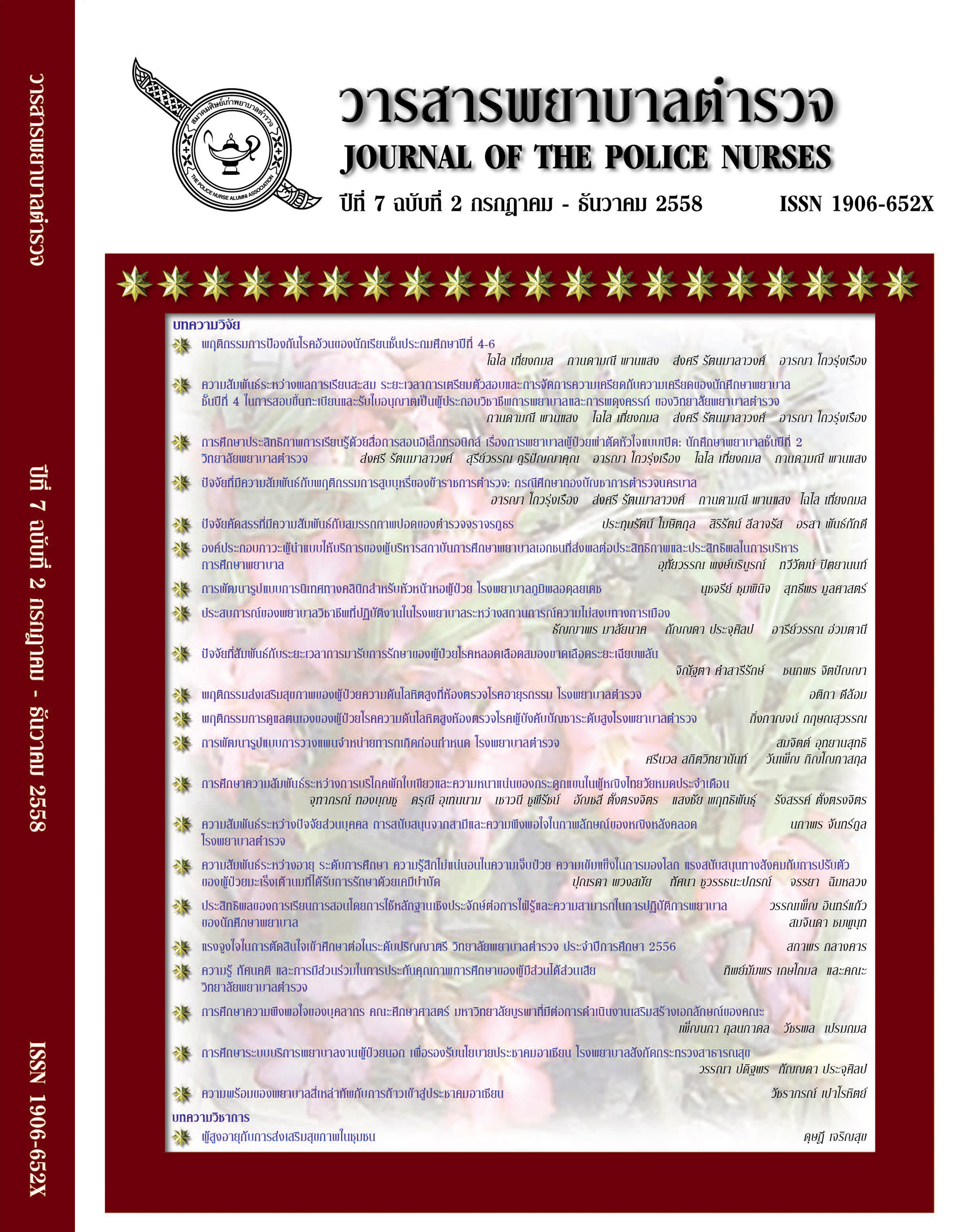พฤติกรรมการดูแลตนเองของผู้ป่วยโรคความดันโลหิตสูงห้องตรวจโรคผู้บังคับบัญชาระดับสูงโรงพยาบาลตำรวจ
Keywords:
พฤติกรรมการดูแลตนเอง, ผู้ป่วยโรคความดันโลหิตสูง, Self Care Behavior, Hypertension PatientAbstract
การวิจัยครั้งนี้มีวัตถุประสงค์เพื่อ 1) ศึกษาระดับพฤติกรรมการดูแลตนเอง ความรู้ ความเชื่อ การสนับสนุนทางสังคม ของผู้ป่วยโรคความดันโลหิตสูงห้องตรวจโรคผู้บังคับบัญชาระดับสูง โรงพยาบาลตำรวจ 2) เพื่อเปรียบเทียบพฤติกรรมการดูแลตนเองของผู้ป่วยโรคความดันโลหิตสูงห้องตรวจโรคผู้บังคับบัญชาระดับสูงโรงพยาบาลตำรวจจำแนกตามปัจจัยส่วนบุคคล ความรู้และความเชื่อเรื่องโรคความดันโลหิตสูง และการสนับสนุนทางสังคมจากครอบครัว โดยใช้ทฤษฎีการดูแลตนเองของโอเรม (Orem, 1998) มาอธิบาย ตัวอย่างที่ใช้ในการวิจัยจำนวน 235 คน เลือกขนาดตัวอย่างจากตารางสำเร็จรูป Krejcie& Morgan (1970) ได้ขนาดตัวอย่างจำนวน 270 คน ทำการเลือกตัวอย่าง โดยวิธีสุ่มอย่างง่าย (simple random sampling) เครื่องมือที่ใช้ในการวิจัยเป็นแบบสอบถามที่ผู้วิจัยได้นำแบบสอบถามของ เนาวรัตน์ จันทานนท์และคณะ (2554) มาใช้และปรับปรุงข้อคำถามให้เหมาะสมกับตัวอย่างที่ศึกษา ประกอบด้วย 5 ส่วน คือ 1) ข้อมูลทั่วไป 2) ความรู้เรื่องโรคความดันโลหิตสูงลักษณะเป็นแบบเลือกตอบใช่ ไม่ใช่หรือไม่ทราบ 3) ความเชื่อเกี่ยวกับความดันโลหิตสูง เป็นแบบมาตราส่วนประมาณค่า 3 ระดับคือเห็นด้วยมาก เห็นด้วยปานกลาง ไม่เห็นด้วย 4) การสนับสนุนทางสังคมเป็นแบบมาตราส่วนประมาณค่า 3 ระดับคือเป็นจริงมากที่สุด เป็นจริงปานกลาง และไม่เป็นจริงเลย 5) แบบสอบถามพฤติกรรมการดูแลตนเอง ลักษณะเป็นแบบมาตราส่วนประมาณค่า 3 ระดับ คือปฏิบัติเป็นประจำ ปฏิบัติบางครั้งและไม่เคยปฏิบัติ ตรวจสอบคุณภาพเครื่องมือโดยการหาความตรงตามเนื้อหาโดยผู้ทรงคุณวุฒิ และค่าความเที่ยงตรงของแบบสอบถามมีค่าเท่ากับ .817, .774, .913 และ .820 ตามลำดับ สถิติที่ใช้ในการวิเคราะห์ข้อมูลได้แก่ ความถี่ ร้อยละ ค่าเฉลี่ย ส่วนเบี่ยงเบนมาตรฐาน ค่าต่ำสุดค่าสูงสุด การทดสอบค่าทีและการทดสอบค่าเอฟ
ผลการวิจัยสรุปได้ดังนี้
1) พฤติกรรมการดูแลตนเอง ความรู้ ความเชื่อ และการสนับสนุนทางสังคมของผู้ป่วยโรคความดันโลหิตสูง ห้องตรวจโรคผู้บังคับบัญชาระดับสูง โรงพยาบาลตำรวจอยู่ในระดับสูง (= 2.09, S.D. = 0.79, 81.3% (N=191),
= 2.67, S.D. = 0.54 และ
= 1.71, S.D. = 0.29) ตามลำดับ
2) ผู้ป่วยที่มีปัจจัยส่วนบุคคลได้แก่ เพศ อายุ สถานภาพสมรส อาชีพ และปัจจัยเสริม ได้แก่ ความเชื่อเกี่ยวกับโรคความดันโลหิตสูง แตกต่างกัน มีพฤติกรรมการดูแลตนเองแตกต่างกันอย่างมีนัยสำคัญทางสถิติที่ระดับ .05 และ .01 ตามลำดับ ส่วนผู้ป่วยที่มีปัจจัยเสริมด้านความรู้เรื่องโรคความดันโลหิตสูงและการสนับสนุนทางสังคมแตกต่างกันมีพฤติกรรมการดูแลตนเองไม่แตกต่างกัน
SELF CARE BEHAVIOR OF HYPERTENSION PATIENTS IN VIP CENTER, AT POLICE GENERAL HOSPITAL
Abstract
The aims of this research were to : 1) examine level of self care behavior, knowledge, belief and social support of the hypertension patients in VIP Center at Police General Hospital performed of hypertension patients in VIP Center at Police General Hospital 3) compare self care behaviors of patients based on their personal factor and supportive factors such as knowledge, belief and social support. Within the context of Orem ‘s self care theory (1998). The participants of this study were 235 people and selected by simple random sampling. A questionnaire was used for data collection from Naowarut Juntanont. et.al. (2011) and adjusted by the researcher.The questionnaire consisted of 5 parts such as personal information, Test for hypertensive knowledge , Belief ,Social support and self care behavior . The hypertensive test was multiples choice and Belief on hypertension ,Social support and self care behavior questionnaire were rating scale 3 level. The content validity was done and reliability for knowledge, belief on hypertension, Social support and self care behavior were .817, .774, .913 และ .820 respectively. Data were analyzed using frequency, percentage, mean and standard deviation, lowest and highest values, t-test, and F-test.
The research results were as follows :
1. The mean score of all self care behavior, knowledge, belief and social support of the hypertension patients in VIP Center at Police General Hospital were at a high level (= 2.09, S.D. = 0.79, N=191( 81.3%) ,
= 2.67, S.D. = 0.54 and
= 1.71, S.D. = 0.29 respectively)
2) Difference in gender, age, marital status and occupation of the hypertension patients did not yield any significant different behavior of taking care of themselves, but difference in having direct-inherited hypertension relatives of the patients yielded different self care behavior significantly at p-value less than 0.05. Difference in having supportive factors of knowledge and social support did not yield different self care behavior of hypertension patients but difference in belief on hypertension disease yield different self care behavior significantly at p-value less than 0.01.
Downloads
Downloads
Published
How to Cite
Issue
Section
License
ผลงานที่ได้ตีพิมพ์แล้วจะเป็นลิขสิทธิ์ของวารสารพยาบาลตำรวจ















